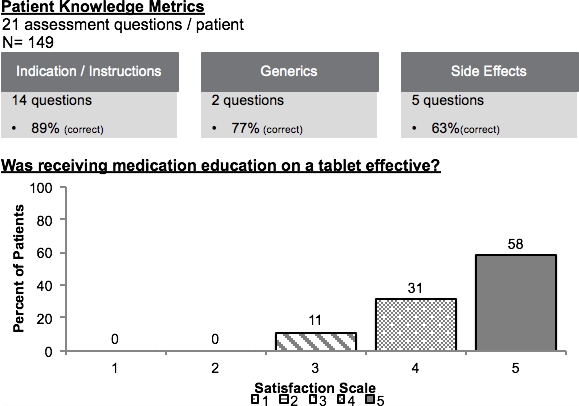Novel Approaches to Medication Teaching in Solid Organ Transplantation.
NewYork-Presbyterian Hospital, Columbia University, New York.
Meeting: 2016 American Transplant Congress
Abstract number: D187
Keywords: Immunosuppression, Kidney transplantation, Kidney/pancreas transplantation, Patient education
Session Information
Session Name: Poster Session D: Organizational and Operational Aspects of Transplantation
Session Type: Poster Session
Date: Tuesday, June 14, 2016
Session Time: 6:00pm-7:00pm
 Presentation Time: 6:00pm-7:00pm
Presentation Time: 6:00pm-7:00pm
Location: Halls C&D
Technology has become a fundamental part of our daily lives; mobile application (app) technologies enhance a healthcare providers ability to deliver patient-centered care. Solid organ transplant recipients require complex medication therapy regimens, thus effective teaching strategies are critical. Integrating patient-facing apps across the transplant care continuum permits individualized care while maximizing resources.
Single-center retrospective study of adult kidney/pancreas (k/p) allograft recipients transplanted Jan-Dec 2015. In this novel teaching approach patients used touchscreen devices to engage in their own learning. Patients meet a virtual pharmacist who reviews the name, indication, dose, side effects, interactions, and special considerations for each medication. Videos are concise, informative, stimulating clips that appeal to a broad patient audience with varying degrees of healthcare literacy. Assessment questions with explanations are used to reinforce key concepts and identify knowledge gaps, which are addressed during tailored in-person sessions.
Virtual teaching has been used with 149 k/p recipients. Patients were ethnically diverse, ranged in age from 20–75 yrs, and 25% had an undergraduate degree or some college. 90% of patients were educated on our standard dual maintenance immunosuppressive regimen and 3 opportunistic infection prophylaxis agents. The majority of patients (89%) correctly answered questions related to drug indication, dosing, and special rules, but many (63%) had difficulty answering questions related to side effects. Feedback was overall positive.
Utilizing virtual teaching and mobile apps may improve the healthcare delivery model in terms of consistency, quality, outcomes, and efficiency of patient education. Healthcare organizations should begin to adopt engaging programs that empower patients to take an active role in their care.
|
Benefits to the: |
|
| Patient | Clinician |
| Improved & continuous access to information | Streamlined workflow |
| Consistent message | Shortened session times |
| Knowledge reinforcement | Real-time data & alerts |
| Enhanced information sharing | Tailored patient follow-up |
CITATION INFORMATION: Tsapepas D, Jandovitz N, Dulanya S, Salerno D, Hammad S, Jordan P. Novel Approaches to Medication Teaching in Solid Organ Transplantation. Am J Transplant. 2016;16 (suppl 3).
To cite this abstract in AMA style:
Tsapepas D, Jandovitz N, Dulanya S, Salerno D, Hammad S, Jordan P. Novel Approaches to Medication Teaching in Solid Organ Transplantation. [abstract]. Am J Transplant. 2016; 16 (suppl 3). https://atcmeetingabstracts.com/abstract/novel-approaches-to-medication-teaching-in-solid-organ-transplantation/. Accessed February 21, 2026.« Back to 2016 American Transplant Congress
